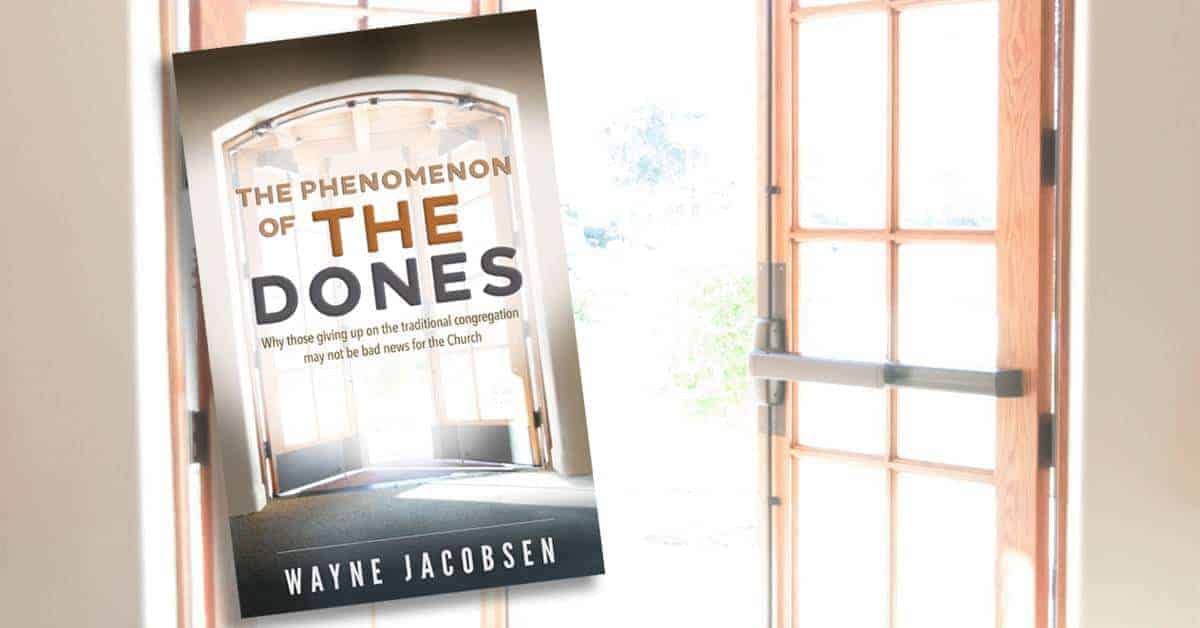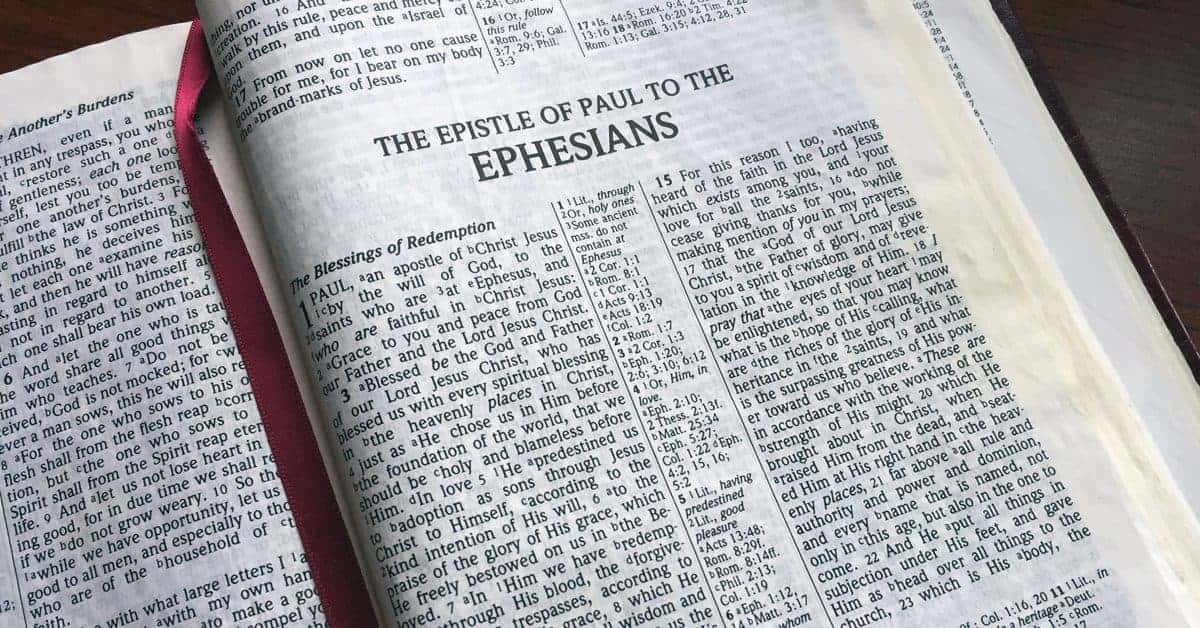To the Saints Scattered…
By Wayne Jacobsen, the final chapter of a book he’s writing about The Phenomenon of the Dones
To the followers of Jesus scattered throughout the world, no longer attached to a specific congregation or denomination: Greetings from one of your kind and from Jesus himself. I pray this letter finds you growing in the affection of our Father, in the trust of his Son, and the wisdom and gentleness of his Spirit.
I know the way has not been easy. It never is for pioneers who move outside an established status quo in search of greater vitality and authenticity. I know most of you didn’t plan to get here; you simply followed the hunger of your heart and his drawing of your conscience until you found yourself outside the circles you used to frequent and for a while found so helpful. Some of you got pushed out for asking the wrong questions, others just stopped going wearied by the politics or how guilt and fear were used to keep people in line.
I have spent the last twenty years among those who have taken their liberty from Christianity-as-a-religion and yet continued to pursue a life in Christ as vibrant as the one he passed on to his disciples. Their journey beyond Sunday morning Christianity only confirmed their choice. The people I admire most in this world are those that follow their spiritual hunger, even when it takes them beyond the comfort of their friends and family. Religion is built on approval needs, and when someone diverges from that conformity, they meet a host of well-intentioned, if not particularly sensitive, people trying to convince them they are wrong.
Jesus knows how painful your journey is better than anyone else. It is a road he walked as well. It is so easy to sing with great passion, “Though none go with me, still I will follow,” and far more difficult to actually do it. When you do, however, I’ve no doubt it brings great joy to him knowing the risk you took to follow him down an uncertain path. Live in that joy as you keep going even if the road is more difficult than you imagined. Your pursuit will reward you in ways you maybe can’t see yet, and fulfill the deepest hungers with his reality, his love, and his freedom.
I realize many of you need no encouragement from me. You have come to know Jesus and learned to follow him apart from the religious conventions of our culture and are finding yourselves increasingly at rest in his provision and being fruitful for him where he has placed you. You have discovered that there is still a church in the world to connect with relationally that doesn’t need the political gamesmanship or the mind-numbing routines of religion. I have met many of you around the world and have been inspired by your courage to take the road less traveled and your resilience in the face of challenge, opposition and false accusations.
Others of you are either new to the journey, or haven’t settled into it yet. Here’s what I’ve learned this far into my journey:
Finding A New Trailhead
The early days of living outside our systems of religious performance can be quite painful, depending on the reason you left and if you have some supportive voices around you. Initially, you’ll feel great relief to be out of the situation that helped you make such a difficult decision. You may have hoped others would have shared in your journey and either come with you or been sympathetic to how God was leading you. Most people, however, find themselves outside alone where three critical challenges await, all of which also hold some great opportunities for growth.
Overcoming Guilt. For a while you’ll feel like you’ve lost your moorings, and your emotions will not be in synch with what you know to be true. You may know attendance at a congregation is not a requirement of our Lord Jesus, but you believed it for so long and may have looked down on others who didn’t come as regularly as you did that you’ll feel guilty when you’re not there and defensive if people ask you about it.
Guilt is the acquired baggage of religious obligation. While we know that there is no longer any condemnation for those in Christ, it’s amazing how much of our Christian experience has been driven by avoiding guilt and the disapproving glances of our fellow believers. It travels mostly unseen as long as you serve it, but when you stop it rears its ugly head. Now you’ll confront it head-on, almost every day and it will test what you know about God, yourself, and what it means to follow him. This is a great time to see Jesus destroy the power guilt and fear hold over you.
You’ll be tempted to do something to sate the guilt, or attack the systems others might enjoy in order to justify your own experience. Resist those urges. This is an important time to find your way to the cross and discover the ways of thinking that create the guilt and condemnation you feel. As you lean more deeply into the Father’s love and his wisdom you’ll find over time the guilt will lessen as will your need to tear others down to feel good about his work in you.
Dealing with Loneliness. If you were heavily involved in your local congregation you may have given it 8-10 hours per week and it gave you the illusion that you were part of something larger than yourself. Even if friendships weren’t as close as you hoped, you felt like you belonged and that masked the loneliness that comes to the fore when you find yourself more isolated. Out of sight, out of mind is how most congregations work. People will miss your contributions more than they’ll miss you.
Now you wonder if anyone was really a friend and does anyone care about you now. That is multiplied if you suffer the sting of judgment that comes if some of your closest friends and family begin top question your salvation, or at least view you as a reclamation project to get you back on the straight and narrow. It may even cause you to doubt you’re making the right choices.
That disappointment grows when new friendships or connections don’t happen as fast as you hoped. Again, the temptation is to do something to fix the problem. Some seek out another congregation, try to find a house church near them or even start their own. But the answer to your loneliness is not “out there” somewhere. It is not in a group you can find, a program you can institute, or a new guru to follow. You’re not looking for a better way to do church, but a better way to embrace his reality. You will find loneliness first satisfied in him and then it will spill into the relationships he will bring across your path.
You may not see it yet and you may even feel as if he has abandoned you, but he has not. He has not led you this far to forsake you and he has not begun a work in you that he will not complete. This is the time to let your relationship with him deepen so you won’t use others to fill the place only he can fill. This is a great season to learn how to seek him, to listen to him, and to follow him and as you do he will swallow up your loneliness in a vibrant communion with him and then you’re ready for more healthy relationships in which true community can grow.
Losing Your Anger. Departing a congregation is often laced with anger—at disappointed expectations, betrayal by people you thought loved you, or finally seeing through some of the false things you were taught to keep you loyal and contributing your time and resources. You’ll want to blame people for lying to you or about you, and strike out against organized religion in general falling prey to an us-versus-them dichotomy that will prove destructive over time.
This is all very natural to justify an extremely difficult decision you had to make and to navigate the self-doubt you will invariably experience. But you’ll want to let it bleed out as soon as you can, which may still take months. Hopefully you can find a safe person who has been down this road before you to vent your pain without it overwhelming those who don’t understand it and will only judge you for it.
In God’s heart this journey is not about fixing “the church”, but drawing you into a deeper relationship with him and letting love over time still the anger of your heart and replace it with joy in his provision and compassion for others, even those who hurt you. This all may take years, so don’t be hard on yourself if the emotions persist. Just keep leaning into him and let his love win you out of feeling like someone else’s victim. No, life isn’t fair and people’s failures will make your life more difficult, but he has a way to navigate you through all of that and give you the life that really is life. And keep in mind that your failures add difficulty to others as well.
Growing in him is a journey, its vitality will ebb and flow at times and there will be seasons where you’ll get distracted, but when he makes you aware guiltlessly lean back his direction.
A real relationship with him doesn’t try to get from him what you want, but to receive what he wants to give you each day. Keep engaging him and don’t pitch a tent anywhere thinking you’ve arrived. Our destination is not in this temporal age. Avoid simply falling into the routines of life and miss how this kingdom yearns to take shape in you and through you find more space in the world.
If you have other believers around you who are on this journey, seek for their help in learning how to ignore guilt, satisfy your loneliness inside of Jesus, and to help you discover how to follow him as a real presence in your life. As you overcome these three challenges and you will find yourself on a very different journey.
Settling into a Different Journey
Now you find yourself on a very different journey. Instead of meeting the expectations of the institution you belonged to, you may find yourself adrift without them. It was so easy when your security came from regular attendance, following the rules, speaking the party line and gaining the approval from others for your diligent efforts. Without those you’ll need to give attention to your connection with God himself. You will want to learn how to recognize his fingerprints in your day, and his words in the recesses of your thoughts.
Don’t look for quick fixes here or rush the process. You cannot learn it in a book; you have to let it unfold in the reality of your circumstances. His curriculum is not in a workbook somewhere, or a university course; it is in the events, emotions, and thoughts of daily life as he comes alongside you to show you what’s real and what is an illusion as you engage with his Spirit and the Scriptures.
Here are three things I use to keep my course:
Relational. If you’re new to this journey and still disoriented by the change from performance-based Christianity, to an affectionate relationship with The Father, Jesus, and the Spirit, take all the time you need. Learn to let the Father enjoy your presence, and for you to enjoy his. If you need space from “religious voices” that seek to promote guilt and fear, take some distance from them. Jesus will show you who you are free to love, and what relationships draw you out of his affection and back into performance.
Eugene Peterson called it, “the unforced rhythms of grace.” Religious obligation and activity can so easily distract us from the purity and simplicity of how Jesus expresses himself to us. God already knows you and now wants you to know him. Jesus died to grant us full and confident access to him. It is not quick and it is not easy to learn how to live in that reality. He has to reshape internally the ways you were taught to live—twisted by indulging your desires, haunted by the insecurities of not knowing you were loved, exploited by the selfishness of others, or manipulated by the lies and fears of religious obligation.
Now he will teach you how to rest in his love, how your growing trust in his desires for you and his purpose in this age will change the way you navigate the world, and how your growing dependence on the power of his Spirit living in you will draw your eyes away from what’s temporal to that which is eternal. Everything God wants to do in you, and all he wants to do through you will grow naturally out of your engagements with him and the people he brings into your life.
If you can find them, spend time with others who stimulate awareness in your own life. Don’t be discouraged if this takes some time or if that initially happens across great distances. Social media and blogs comments might be a good place to connect as well, even if you can’t be face-to-face. Beware the cheap fix of on-line networks or getting an identity from following a popular author or teacher. That may comfort you with a false security that it will soon evaporate.
In time, you’ll begin to meet people around you on a similar trajectory. Jesus is inviting an increasing number of people back to himself and creating a people who will follow the Lamb wherever he goes. You’ll find those faster, however, if you’re just looking for growing friendships with those already around you, not by finding or building a group of like-minded people. Keep your eyes open for a hungry seeker at work, an open-hearted neighbor, someone you meet randomly, or connect with at another gathering or mission outreach. Fellowship grows from friendships a lot easier than friendship grows from meetings.
Truth-full. Don’t just throw out the illusions without rethinking where God’s truth lies. De-constructing the false messages of religion that feed performance and destroy community is a painful process. Not everyone survives it with a passion for truth. Once you find out some of the things you were taught aren’t true, it’s easy to throw out everything or just hold on to those things that you find personally comforting. Many have taken this course into the theological weeds and gotten lost in the skepticism about God and his truth.
Truth will often disturb us before it sets us free. Scripture underlines how hungering for truth is the most important component to grasping it. Don’t seek voices who say what you want to be true, ask the Father to reveal his truth to you. Search your heart, search the Scriptures, and interact with others in conversation and through books and articles in a way that will help you re-construct an understanding of who God truly is and his purpose in the world. God didn’t bring you out of religious performance to leave you drifting on the winds of circumstance, but to draw you into a relationship that is not only intimate but transforming.
You won’t have all the answers and you’ll lose your need to convince others that you see it better than they do. You’ll learn to walk with him in the truth that is sometimes challenging and painful, but it will always draws your heart more closely to him. Don’t expect this truth to be as much measured by principles you can follow, but in learning to discern in your unfolding day which decisions leads to life and which leads to death. This is where he always wanted to write his will, not in precepts to follow, but learning to sense the pleasure of the Spirit in the direction he desires for us and the restlessness of Spirit when he’s drawing us away from our own selfishness. That’s how you learn to walk with him.
Purposeful. When you are part of a religious program everything is provided for you. You have fellowship because you sit in a congregation, worship because you sing, and engage spread the kingdom because your congregation gives to overseas missions. But those are simply shadows of a greater reality. To embrace those realities now you will need to make some intentional choices to follow his leadings, embrace his purpose in circumstances around you, and to live focused more on others than yourself.
It is easy for all of us to drift into complacency regarding spiritual realities. Life takes so much out of us just to complete our job responsibilities and care for our families. It also distracts us with too many entertainment options that it’s easy to end up coasting spiritually into emptiness. Growing in him and flowing with his purpose won’t happen by accident, but it also won’t happen by human ingenuity. I realize that sounds like a contradiction. What you will want to do is to learn to live in the moment, with a growing trust in Spirit’s ability to lead and guide you. Being intentional is not doing what we prefer or even think best, but to see where love leads us and where his Spirit nudges us.
When you stop serving someone else’s vision it will be easier to recognize his leading. Let him grow your capacity to love so that you’ll have a heart of compassion for the broken, and be a champion of justice for the oppressed. Confront evil where it exploits the innocent, quickly repair broken relationships where possible with forgiveness and honesty, and treat others the way you want them to treat you.
Walking by the Spirit comes with a suspicious eye toward our own human effort, but an intentional eye on the Father and flowing with his activity in the world.
Helping Others Find Their Journey
The time is coming when all that you’ve discovered will not just be valuable for you, but will overflow from you to so many others who are hungering for the same realities that lie beyond the walls of their own experience. Jesus designed his kingdom to work that way. As freely as you receive, you look for ways to freely give to others. As you find more relaxed footing in your relationship with him look for ways to be a blessing to others.
I’m convinced this is what it means to pastor the flock of God. It doesn’t require a degree or a job managing an institution; it is simply the ability and desire to help others connect with Jesus and encourage them as they learn to follow him. God works through the simplest people who have sincere hearts, not the highly talented or those who seek influence. Sharing your life freely is not a task you have to do, but one that will flow out of your heart naturally as you make yourself available to him:
Live lovingly. What I enjoy most about this journey is that all the obligations and expectations I lived under were replaced with a sense of endearment. I don’t follow God because I’m afraid of him, but because I want what he wants for me. I don’t do what I do in fear that he will punish me but because I want to share in the work he is doing around me. Obligation was replaced with joy and though I can’t stop and love everyone I pass on a given day, I’ve always got an eye out for the person God wants me to engage or to serve in some way.
Live freely. There will be no end of well-meaning people who will want to push their preferences and expectations on you. You can be gracious as you politely say, “No, thank you.” Embrace what God gives you, and turn from those things others want to force on you. Life is too short to let people manipulate you even with the best of their religious intentions. You are to live to him, free from the tyranny of your own spiritual ambitions, and free from others’ as well.
Live generously. Keep an eye out for the needs and welfare of others, sharing whatever you might have to be a blessing in someone else’s life. Build friendships and share those friendships with others by connecting people who will be blessed to know each other. This is how his church grows in the world. Don’t just love those who can love you back, but take time with people who do not yet have any capacity for love, so that they can see him in you.
Live genuinely. No one needs you to pretend to be someone you’re not or further down the road than you are. We best help people when we let them look into the reality of our lives to see both where God has shaped his life in us and where we still struggle. Impress people with your honesty not by pretending to be further down the road than you really are. Sharing your own doubts and failures are as important as telling others how God makes himself known to you. None of us has it all together and authenticity laced with humility creates the vulnerable environment where the best conversations happen. It will free you to love and to honesty without the need to fix others or make them part of your agenda.
Live justly. Life is inherently unfair and it is somehow in the nature of powerful people to exploit others for their own gain and notoriety. The kingdom comes to bind up the brokenhearted, to free the oppressed, and to help the poor and downtrodden. Keep an eye out for those whom the culture exploits and be a champion for compassion and justice. Don’t make conformity the currency of relationship, but care and concern. You cannot love all the people in the world, so love well those God puts before you each day.
In Christ Alone
Jesus is doing an amazing thing in our day; he is taking his church back. He’s calling people from every corner of this world to find him as their sole allegiance. Some of those are inside traditional congregations, and many others he is inviting outside to teach them another way to live and grow.
The truth be told, we are all part of the saints scattered, even those who regularly attended a local congregation. The saints have been scattered for a long time, divided by institutions, doctrines, leaders, and programs each believing their way is the best. For those of us who have moved beyond Sunday gatherings as the focus of our faith, we need to take care that we guard our hearts to explore the wonder of the whole body of Christ as she is in the world. Almost every group that has splintered off of Christian institutions in the past have gone on to create their own, looking down on those who didn’t live it the same way they did.
It would seem the courage it takes to leave religious obligation easily bends toward pride and an air of superiority if we’re not careful. Yes, our institutional systems can be deeply flawed as they try to express God’s reality in the world, but that doesn’t mean we need to condemn them or think less of those who attend them. Our world is touched for the better by many of those congregations. Though it may not be the best way for your hungers to be met, resist the desire to reject others who see it differently. Don’t think your path is their path or that those not on it can’t know and follow the God you’re growing to know. He has many sheep and he does not lead all on the same path.
Always keep in mind that it is Jesus’ desire to reconcile all things to himself, and thus all of us to each other. This is the unity he prayed for with such passion. That we would all be one, as he and the Father are one. We have too long looked for that to come from our institutions or our agreed-upon doctrines, but that approach has failed us spectacularly. The unity Jesus prayed for can only come through transformed lives as we let God’s kind of love permeate our own hearts and free us to live with increasing selflessness and generosity in a world that knows too little of either.
Give yourself to what leads to authentic unity. Remember this is his work not yours, so be patient and don’t think you will have to compromise his work in you to love others who are on a different journey. Don’t be afraid to follow your heart, and encourage others to follow theirs as well. While you will often be judged maliciously, don’t resolve your pain by judging back. Bring those accusations to God and leave them there. If he is not asking you to change, don’t let others press you towards it.
Let all kinds of people into your life to see what loving them might do. Those who criticize how you live your life, may not be against the Jesus we love and seek to follow. Don’t exalt yourself because God has given you more to see, use it as a way to serve others so that they will have a chance to see it, too.
This is the trajectory he invites all his children on and if it has taken you outside the walls of institutionalism it was not to separate you from his people, but to draw you more deeply into the life that truly is life and to free you to share that love without any borders. His purpose was not to leave you isolated and scattered in the world, but increasingly transformed by love so that he can knit you into the fabric of his church as she is taking shape around the world today.
And she is taking shape in ways most people miss. Wherever I travel in the world I meet people who are really learning to live a journey in Christ that is transforming them from the need to serve themselves and to a more generous heart for others. These are the stories that thrill my soul and give me hope. They are being led by Jesus often in direct contradiction to their own self-interest. Soon they will be knit together by his Spirit in ways we cannot yet conceive, but will speak of his glory far more than our own ingenuity.
Let’s take care that we do not exalt anything above Christ and Christ alone, the hope of glory for every individual. Don’t give people a reason to be distracted by your pet doctrines, cute terminology, a specific program that may have been useful for you but may not be for them. Focus on him and his reality and watch him reveal himself in almost every relationship you have. Don’t fragment his family because you want to make a name for yourself, to brand an identity, or to carve off a market share for your ministry.
Share freely as God cares for you. Yearn for the day when we will be truly one flock with one Shepherd. As long as we have other humans between us and our compassionate High Priest, we will continue to live splintered into discordant factions. The world is not surprised by such
But imagine what it would think if they really saw the followers of Christ loving each other deeply, from the heart. There he will be revealed in ways that will draw the most calloused sinner to recognize who he is. And then we won’t be scattered anymore, but one body permeating every corner of our world with the life and love of Jesus.
__________________
This is the final chapter in a series called The Phenomenon of the Dones by Wayne Jacobsen who is the author of Finding Church and host of a podcast at TheGodJourney.com. You can read the first half here and subsequent parts below. It will eventually be made into a book for people to read more easily.
- Part 8: Five Factors Contributing to the Decline in “Church Attendance”
- Part 9: An Invitation Not An Imposition
- Part 10: The Conversations that Matter Most
- Part 11: Monetizing Ministry
- Part 12: Handling the Truth
- Part 13: Do You Have Community?
- Part 14: Reaching Across the Divide
- Part 15: Waiting for Revival
- Part 16: How Much Did Paul Get It Wrong?
- Part 17: Drawing a Line where Lines Don’t Have to be Drawn
- Part 18: Intentionally Relational
- Part 19: Do You Need a Covering?
These chapters will be combined into an e-book for future reference in the near future.












